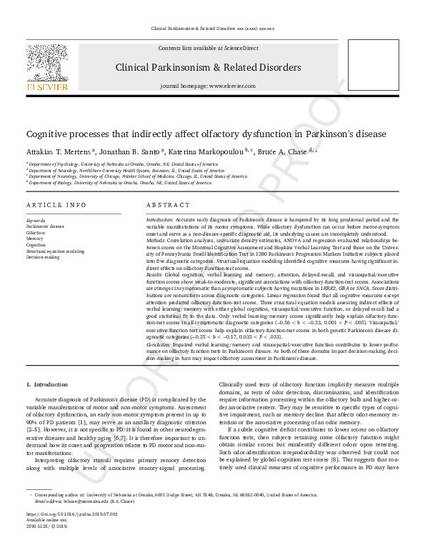
Article
Cognitive processes that indirectly affect olfactory dysfunction in Parkinson's disease
Clinical Parkinsonism & Related Disorders
(2019)
Abstract
Introduction: Accurate early diagnosis of Parkinson's disease is hampered by its long prodromal period and the variable manifestations of its motor symptoms. While olfactory dysfunction can occur before motor-symptom onset and serve as a non-disease-specific diagnostic aid, its underlying causes are incompletely understood. Methods: Correlation analyses, univariate density estimates, ANOVA and regression evaluated relationships be- tween scores on the Montreal Cognitive Assessment and Hopkins Verbal Learning Test and those on the Univer- sity of Pennsylvania Smell Identification Test in 1280 Parkinson's Progression Markers Initiative subjects placed into five diagnostic categories. Structural equation modeling identified cognitive measures having significant in- direct effects on olfactory-function-test scores.
Results: Global cognition, verbal learning and memory, attention, delayed-recall, and visuospatial/executive function scores show weak-to-moderate, significant associations with olfactory-function-test scores. Associations are stronger in symptomatic than asymptomatic subjects having mutations in LRRK2, GBA or SNCA. Score distri- butions are nonuniform across diagnostic categories. Linear regression found that all cognitive measures except attention predicted olfactory-function-test scores. Three structural equation models assessing indirect effects of verbal learning/memory with either global cognition, visuospatial/executive function, or delayed-recall had a good statistical fit to the data. Only verbal learning/memory scores significantly help explain olfactory-func- tion-test scores in all symptomatic diagnostic categories (−0.56 < b < −0.23, 0.001 < P < .005). Visuospatial/ executive-function test scores help explain olfactory-function-test scores in both genetic Parkinson's disease di- agnostic categories (−0.25 < b < −0.17, 0.032 < P < .033).
Conclusion: Impaired verbal learning/memory and visuospatial/executive function contributes to lower perfor- mance on olfactory function tests in Parkinson's disease. As both of these domains impact decision-making, deci- sion-making in turn may impact olfactory assessment in Parkinson's disease.
Disciplines
Publication Date
2019
Citation Information
Jonathan Bruce Santo. "Cognitive processes that indirectly affect olfactory dysfunction in Parkinson's disease" Clinical Parkinsonism & Related Disorders (2019) Available at: http://works.bepress.com/jonathan_santo/77/
